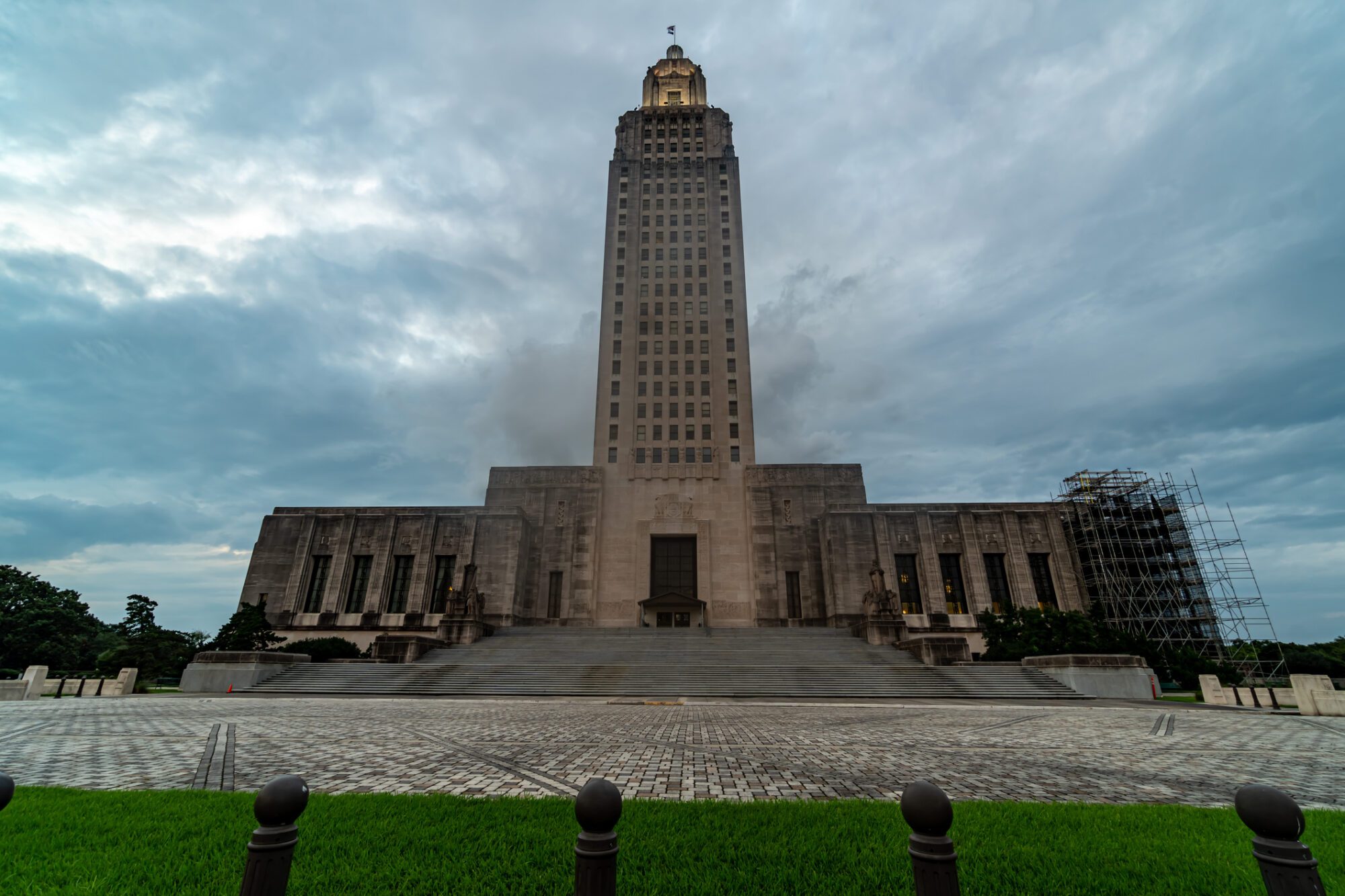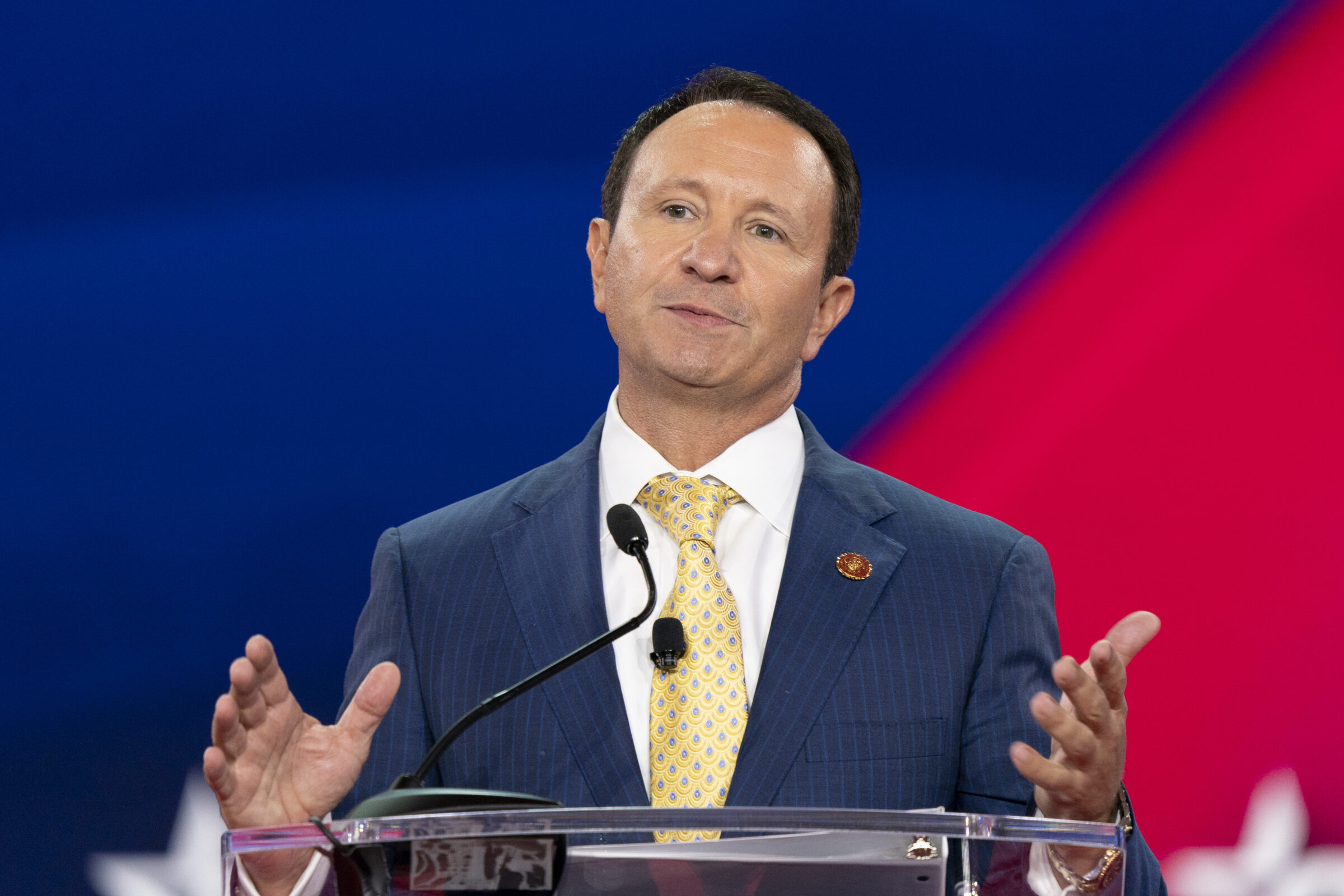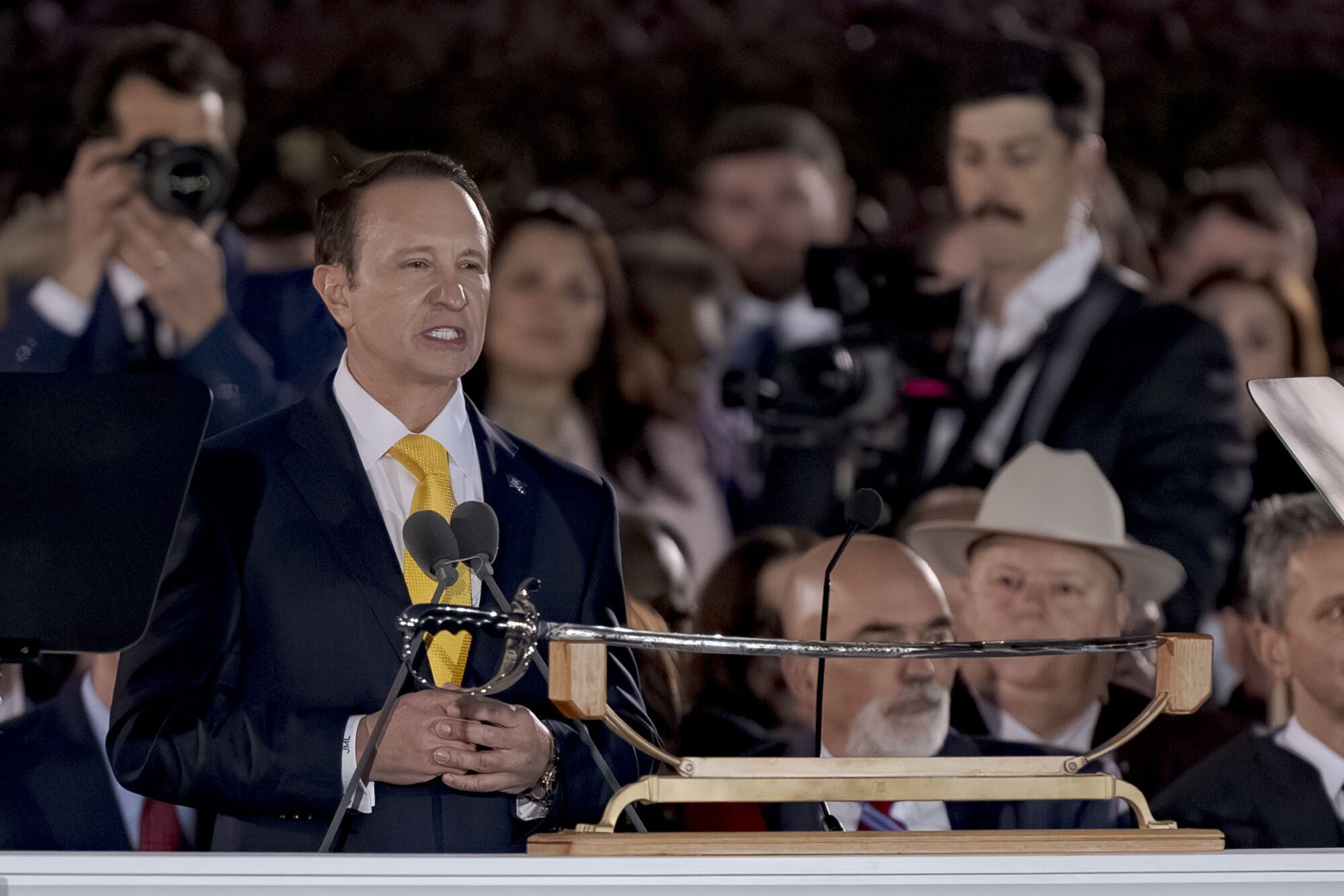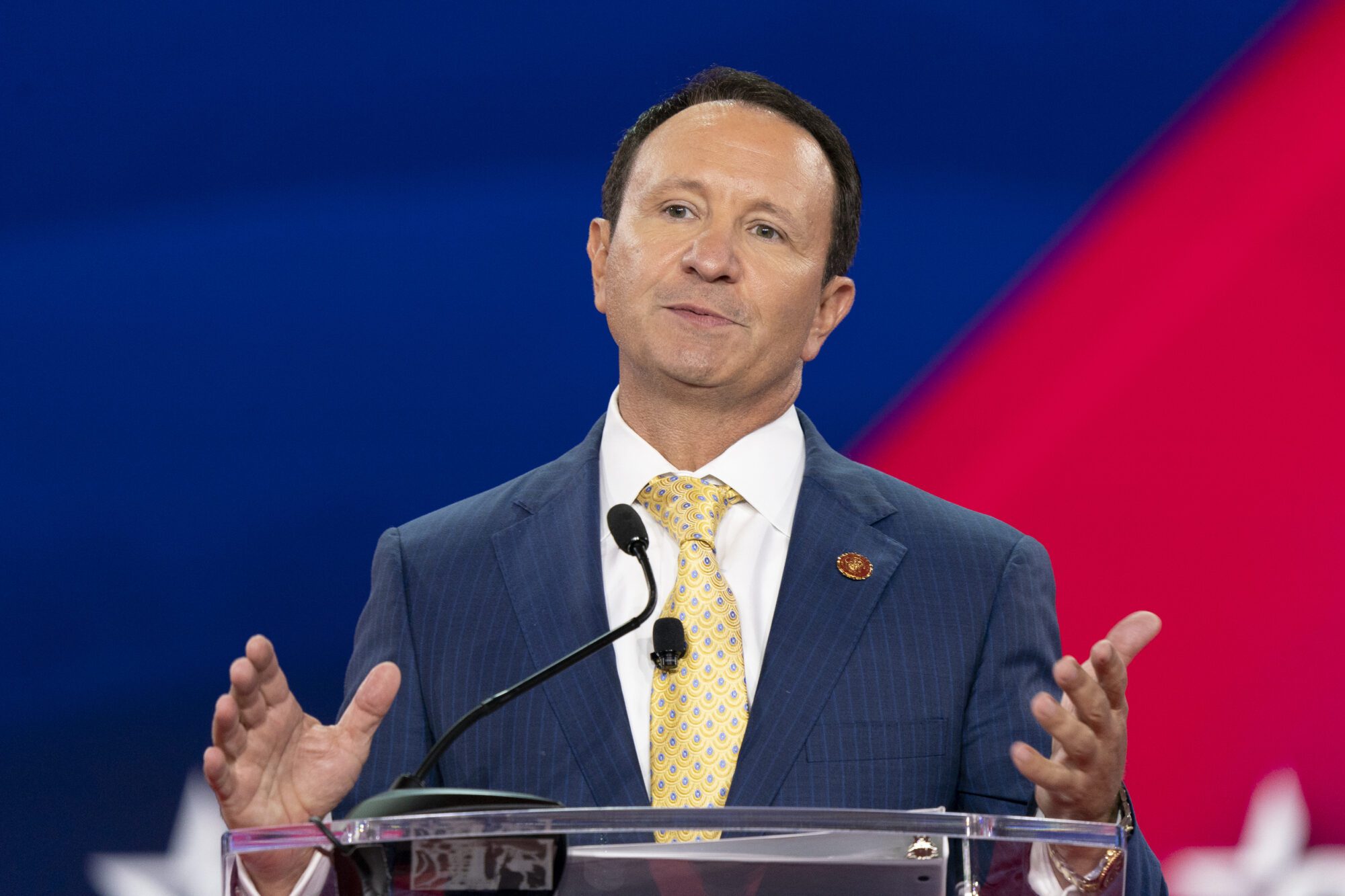“We’re Going to Be Overwhelmed”: How Louisiana Just Ballooned Its Jail Population
Louisiana's governor championed a raft of new laws that double down on punishment, fueling a cycle of incarceration that sends more money into local sheriffs' coffers.
| March 8, 2024

In February, as the Louisiana legislature debated Senate Bill 3, which would move all 17 year olds charged with a crime out of the juvenile justice system and back into the adult system, Will Harrell, an advisor to New Orleans Sheriff Susan Hutson, went to update the department’s Prison Rape Elimination Act coordinator on the proposed changes. He watched as tears came to her eyes. Teenagers are uniquely vulnerable to physical and sexual abuse in adult jails, and federal law requires they be separated from the adult population, which often translates to solitary confinement conditions. “She knows what that means for these kids,” Harrell told Bolts.
The bill quickly passed and was signed into law by Louisiana’s new governor Jeff Landry on Wednesday. Now, Harrell is scrambling to figure out how to absorb dozens of 17 year olds into the already-overburdened Orleans Parish Justice Center once SB 3 takes effect in April. “We’re already at capacity. We’re under a consent decree,” he said. “I talked to deputies who were there seven years ago when they had kids. And they were like, ‘oh, this is just going to be a mess.’”
“In conjunction with other legislation pending during this special session, we anticipate a massive, unmanageable population explosion at OJC,” Hutson wrote in a statement.
Landry sailed into the governor’s office last November after a campaign filled with crime-and-punishment rhetoric. Despite the fact that Louisiana already has the nation’s highest rate of incarceration, he made one of his first acts as governor convening a special legislative session on crime. In an extraordinarily fast nine-day session which ended last Friday, Republican lawmakers passed all 37 bills under consideration, a grab bag of tough-on-crime proposals that included restricting post-conviction relief, increasing law enforcement immunity, and legalizing execution methods such as nitrogen gas and the electric chair.
Sarah Omojola, the director of the Vera Institute of Justice’s New Orleans office, called it a “one hundred percent” rollback of the Justice Reinvestment Initiative, the raft of bipartisan criminal legal reforms passed under former Democratic Governor John Bel Edwards in 2017. “In some instances, this isn’t just a rollback,” she added. “This is taking us back to the early 2000s, late ‘90s.”
Observers are just starting to take stock of what this flurry of new legislation will mean for crime deterrence, and for the state budget. But Omojola, Harrell, and others are already certain that several different measures will work together to significantly grow the state’s pretrial populations, as well as the number of people sentenced and serving time. Other bills effectively eliminate parole, vastly restrict “good time” credits, and mandate prison time for technical violations of parole and probation.
“Of course it’s going to balloon the prison population. Every single time these kinds of laws go into play, the incarceration rate jumps,” said Lydia Pelot-Hobbs, a University of Kentucky geography professor whose 2023 book, Prison Capital: Mass Incarceration and Struggles for Abolition Democracy in Louisiana, examines incarceration in the state. “That’s just basic math.”
And in Louisiana, that means, once again, a profound and reverberating impact on parish jails and sheriffs. Owing to a unique arrangement designed to address overcrowding and bad conditions at Angola prison back in the 1970s, Louisiana’s local lock-ups house more than half of its state prisoner population.
Jails operate as sort of a carceral shadow system: deadlier than the state prison system, lacking many of its resources and offerings, and run by sheriffs, who are comparatively unaccountable to state officials. East Baton Rouge Parish Prison, a dangerous jail that has for 15 years running been presided over by the same notorious sheriff, for instance, does not allow in-person visits, even though some of the people held there have been incarcerated for years on end. If someone dies in custody in a Louisiana jail, officials have no responsibility to notify their loved ones.
The Louisiana Sheriff’s Association, which lobbies on behalf of the state’s 64 sheriffs, testified in favor of SB 3, despite Hutson’s opposition. “It’s not just a bill that we are supporting, this is a bill that is part of our plan,” spokesperson Mike Ranatza told the Senate Judiciary Committee. “This is what we asked the governor to entertain for us in the special crime session…this is what the overwhelming majority of our sheriffs have asked for.”
The jail system runs on “per diem” payments that the state grants local law enforcement in exchange for jailing people who have been sentenced to state prison, payments which this year will total $177 million. More prisoners means more money for sheriffs across the state—and likely future efforts to expand jails, according to Pelot-Hobbs.
“Louisiana law enforcement agencies are uniquely invested in incarceration” because of the per-diem system, Omojola told Bolts. “They financially benefit from people who are being held in their jails without providing any of those programs or resources.”
The origins of today’s jail arrangement has its roots not in tough-on-crime policies, but in a lawsuit filed by four Black Angola prisoners challenging the conditions of their confinement. In 1975, in response to the lawsuit, a federal judge limited Angola’s population. Rather than build new prisons, it was cheaper and easier for the state to transfer some prisoners to local jails to serve the remainder of their sentences. At first, Pelot-Hobbs writes in Prison Capital, sheriffs protested. But after the per diem system was instituted, they began to consider their new prisoners a boon, even asking Angola to send them more people.
By the 1990s, Pelot-Hobbs argues, jails had gone from being a “temporary spatial fix” to “the long-term geographic solution for the Louisiana carceral state.” Sheriffs, now reliant on the per-diem money, organized for jail expansion to hold more state prisoners. Between 1999 and 2019, the state added some 14,000 jail beds. “Other parishes built out huge jails that they’ll never need for their local population,” said Harrell. “It’s like a hotel. You open up the hotel, DOC sends you some kid from New Orleans, they pay you for the hotel rooms. And that literally is why you have the jail.”
This system may financially benefit local sheriffs and the state department of corrections, but it comes at the expense of the people locked up in their jails. “There’s nothing on the inside,” said Amelia Herrera, an organizer with Voice of the Experienced’s Baton Rouge chapter who spent time in the East Baton Rouge Parish Prison in 2015 and has a loved one currently incarcerated there. Officials, she said, “will say the reason there’s no type of programs inside of this facility is because it’s a pre-trial facility…But when we have people in there for six and seven years?”
“You can’t visit,” she added. “They make it almost impossible to keep a connection with the outside.”
As it stands, providing no programming or visits even for people locked up for years on end is legal. Louisiana’s regulations governing how people should be treated while incarcerated in its jails are notably minimal and vague. While the state has a set of “basic jail guidelines” that apply to facilities that house state prisoners, a 2023 report by the University of Texas at Austin’s Prison and Jail Innovation Lab found that they fell short compared to regional counterparts like Texas and Florida. The report determined that the state’s jails have little to no requirements regarding transparency around in-custody deaths, adequate heating and cooling systems, or in-person visiting rights, and that their regulations around discipline are the least comprehensive of anything they reviewed. It also noted that the family members of incarcerated Louisianans contend that the regulations that do exist are routinely flouted.
The state legislature had commissioned the report, which concluded with a set of recommendations for jails to adopt guidelines prohibiting corporal punishment and the denial of basic needs like water or sleep. But when the lab’s director, Michele Deitch, and her team submitted their work last fall, the Louisiana Sheriff’s Association immediately sent a letter expressing appreciation for the work but signaling they would not follow the bulk of their recommendations, citing concerns over security plus limited capacity.
The report was completed several months before Landry took office. Now the new raft of bills passed during the special crime session threatens to turbocharge Louisiana’s cycle of jail expansion, exacerbating the problems already on display in the report’s pages before the state does much to try to remedy them.

Omojola highlighted three bills proposed by Republican Senator Debbie Villio, HB 9, 10, and 11, which, taken together, “essentially work to make sentences much much longer—and therefore fill our prisons and our jails,” she said. HB 9 aims to abolish discretionary parole in most cases, HB 10 limits the accumulation of “good time” credits meaning that an individual would be required to serve at least 85 percent of his sentence without exception, and HB 11 increases the penalties for even technical violations of parole or probation.
Harrell noted that HB 9 and 10 may have an indirect impact on the pretrial population as well, because they take away people’s incentive to accept a plea offer. With vastly reduced prospects of getting out on parole or getting a sentence reduced with “good time” credits, people may be less keen to accept a conviction and start getting their time over with, and more likely to wait out a trial date in jail. “When that’s taken away from them, they are like, ‘Well, then why should I leave? I’m just gonna stay here in jail and roll my dice and hopefully somebody on a jury will decide that I’m not guilty,’” he said.
Villio, the bills’ sponsor and an ally of Landry’s, contends that these laws won’t increase prison populations as long as judges adjust their sentencing decisions accordingly. In a text message to Nola.com, she said, “It requires a mind-reset on sentencing that in the end should result in a wash. We, of course, will be monitoring that.” When Bolts asked how this sort of paradigm shift for judges would work in practice, Villio said, “I have the utmost confidence in our judiciary,” noting she believes that trainings have already been scheduled.
The Crime and Justice Institute, a policy analysis group, has studied other states’ implementation of similar determinate sentencing laws; Leonard Engel, the group’s director of policy and campaigns, told Bolts their research shows that judges do not ultimately adjust their sentences anywhere enough to make up the difference in years served.
HB 11, the bill dealing with technical violations of probation and parole, is also alarming to reform advocates like Bruce Reilly of Voice of the Experienced. Under the terms of the bill, people on parole or probation who are merely re-arrested, not even convicted, could get sent to prison. “That’s really where the sheriff and jails are gonna get their bread and butter,” Reilly said.
The special session also passed a law requiring 20 year mandatory minimums for carjacking cases that involve bodily injury and established financing to establish a state trooper force for New Orleans. “That’s gonna rack up a whole bunch of new arrests,” Harell said of the state trooper force. “Where do you think those people are gonna be housed?”
Overcrowding is likely to lead to an expansion of the footprint of local jails in what Pelot-Hobbs predicted could be a repeat of the same patterns of the 1980s and 1990s. The Crime and Justice Institute estimates that the additional prison time people in a given year serve under HB 9 and 10, instead of getting out on “good time” credits or parole, will cost the state upwards of a billion dollars over time. And that’s before any budget increases sheriffs could ask for—and they are likely to ask, Pelot-Hobbs said. “We’re going to see sheriffs organizing and pushing to expand their jails for this moment,” she said. “We are going to see sheriffs mobilizing and organizing to get either property taxes or millages or sales taxes to get more jail space to incarcerate the state prisoners. I also think we’re likely going to see them lobbying the state legislature for higher per diem rates.”
Advocates worry that the growth of local budgets and contracts, combined with Landry’s efforts to reduce accountability for law enforcement, will add to the state’s problems with cronyism. “It’s going to fuel the corruption, the closed circle of sheriffs and the folks who contract with them, who will know that there’s more money to be had if they can land the contracts for this jail expansion and for the increased services needed for a larger population,” says Julien Burns, the communications lead for Sheriffs for Trusting Communities. Along with Common Cause, the group has documented how sheriffs receive millions in campaign contributions from guard uniform makers, telecoms and bail bonds companies, and contractors that may hope to secure lucrative contracts with the department.
In the waning days of the special crime session, a discussion finally arose about the collective impact of these bills on Louisiana’s jails, with even conservative lawmakers such as Villio, the sponsor of HB 9, 10, and 11, expressing an awareness of the need for greater programming and services in the jails. “Everybody’s on record, saying the right thing—like if we’re gonna do this, we can’t just warehouse [people]. We’re gonna have to address the issues,” said Harrell. The legislature now moves to its regular session, where some of these issues could be hammered out.
Dramatically expanding jail programming, of course, would mean an even greater expansion of the carceral budget in Louisiana. Pelot-Hobbs said that she doubts that substantive programming will actually materialize in the jails. “I just think it’s a false promise,” she told Bolts. “And even if the promise came true, it’s still just acquiescing to the general kind of commitment to incarceration as the solution.”
Still, in Harrell’s view, allocating such resources is crucial given the vastly restricted terrain for criminal legal transformation in the state as long as Landry is in office. “These tough on crime Republicans are running the show,” he said. “There’s no going back right now, at least for the next four years. And so to the extent people are concerned about the health and safety of people who are currently incarcerated, who will soon be incarcerated under these legislations, they need to understand that programming resources matter.”
Nola.com reported this week that the exact costs of the laws that have already passed in February are uncertain because lawmakers rushed them through, suspending usual rules that would have entailed more attention to the budget.
The state’s decision to double down on incarceration, Pelot-Hobbs added, will affect public spending in other areas, too. “As money gets more and more directed towards these kinds of expenditure projects, less funds are going to be available for road construction, levy construction, schools,” she said. “The criminal legal system never operates in a silo.”
Sign up and stay up-to-date
Support us
Bolts is a non-profit newsroom that relies on donations, and it takes resources to produce this work. If you appreciate our value, become a monthly donor or make a contribution.




